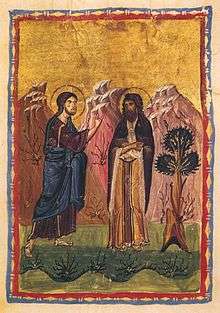Parable of the Two Sons
For another parable told by Jesus about two sons, see Parable of the Prodigal Son.

Jesus and John the Baptist (15th century).
The Parable of the Two Sons is a parable told by Jesus in the New Testament, found in Matthew Matthew 21:28–32. It contrasts the tax collectors and prostitutes who accepted the message taught by John the Baptist with the "religious" people who did not.
Narrative
The parable is as follows:
"But what do you think? A man had two sons, and he came to the first, and said, 'Son, go work in my vineyard.' He answered, 'I will not,' but afterward he changed his mind, and went. He came to the second, and said the same thing. He answered, 'I go, sir,' but he didn't go. Which of the two did the will of his father?"They said to him, "The first."
Jesus said to them, "Most certainly I tell you that the tax collectors and the prostitutes are entering into the Kingdom of God before you. For John came to you in the way of righteousness, and you didn't believe him, but the tax collectors and the prostitutes believed him. When you saw it, you didn't even repent afterward, that you might believe him."— Matthew 21:28–32, World English Bible
Interpretation
In this parable, Jesus speaks to those who believed they were without sin. The nonbelievers, the tax collectors and prostitutes, were accepting the message taught by John the Baptist and were repenting. The parable of the Pharisee and the Publican has a somewhat similar theme.
References
This article is issued from Wikipedia - version of the 10/23/2016. The text is available under the Creative Commons Attribution/Share Alike but additional terms may apply for the media files.
